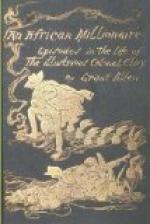We drove back from this first interview none the less very well satisfied. The price was too high; but preliminaries were arranged, and for the rest, the Count desired us to discuss all details with his lawyers in the chief street, Unter den Lauben. We inquired about these lawyers, and found they were most respectable and respected men; they had done the family business on either side for seven generations.
They showed us plans and title-deeds. Everything quite en régle. Till we came to the price there was no hitch of any sort.
As to price, however, the lawyers were obdurate. They stuck out for the Count’s first sum to the uttermost florin. It was a very big estimate. We talked and shilly-shallied till Sir Charles grew angry. He lost his temper at last.
“They know I’m a millionaire, Sey,” he said, “and they’re playing the old game of trying to diddle me. But I won’t be diddled. Except Colonel Clay, no man has ever yet succeeded in bleeding me. And shall I let myself be bled as if I were a chamois among these innocent mountains? Perish the thought!” Then he reflected a little in silence. “Sey,” he mused on, at last, “the question is, are they innocent? Do you know, I begin to believe there is no such thing left as pristine innocence anywhere. This Tyrolese Count knows the value of a pound as distinctly as if he hung out in Capel Court or Kimberley.”
Things dragged on in this way, inconclusively, for a week or two. We bid down; the lawyers stuck to it. Sir Charles grew half sick of the whole silly business. For my own part, I felt sure if the high well-born Count didn’t quicken his pace, my respected relative would shortly have had enough of the Tyrol altogether, and be proof against the most lovely of crag-crowning castles. But the Count didn’t see it. He came to call on us at our hotel—a rare honour for a stranger with these haughty and exclusive Tyrolese nobles—and even entered unannounced in the most friendly manner. But when it came to L. s. d., he was absolute adamant. Not one kreutzer would he abate from his original proposal.
“You misunderstand,” he said, with pride. “We Tyrolese gentlemen are not shopkeepers or merchants. We do not higgle. If we say a thing we stick to it. Were you an Austrian, I should feel insulted by your ill-advised attempt to beat down my price. But as you belong to a great commercial nation—” he broke off with a snort and shrugged his shoulders compassionately.
We saw him several times driving in and out of the schloss, and every time he waved his hand at us gracefully. But when we tried to bargain, it was always the same thing: he retired behind the shelter of his Tyrolese nobility. We might take it or leave it. ’Twas still Schloss Lebenstein.
The lawyers were as bad. We tried all we knew, and got no forrarder.
At last Charles gave up the attempt in disgust. He was tiring, as I expected. “It’s the prettiest place I ever saw in my life,” he said; “but, hang it all, Sey, I won’t be imposed upon.”




